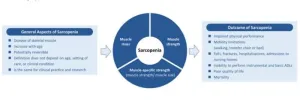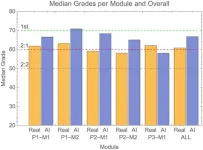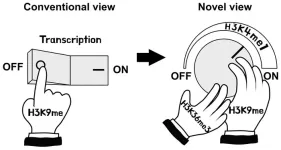Revolutionizing ovarian cancer treatment with adaptive PARP inhibitor therapy
Innovative study reveals dose modulation as key to reducing toxicity and combating resistance
2024-06-26
(Press-News.org) TAMPA, Fla. — Ovarian cancer, often diagnosed at an advanced stage, presents significant treatment challenges because patients tend to develop resistance to conventional therapies quickly. Despite aggressive treatment, recurrence rates remain high, and managing this disease effectively requires innovative approaches. Poly-adenosine ribose polymerase (PARP) inhibitors have emerged as a treatment option, targeting specific DNA repair mechanisms in cancer cells. However, their use is often limited by toxicity and emerging drug resistance.
A new study led by researchers at Moffitt Cancer Center introduces an adaptive therapy approach that could optimize PARP inhibitor maintenance therapy, offering a more personalized and potentially less toxic treatment option for patients. Their work is featured as the cover article of the June 19 issue of Cell Systems.
PARP inhibitors are a targeted therapy that block a protein that helps repair damaged DNA. This can keep cancer cells from repairing themselves once they’ve been damaged by chemotherapy, resulting in cancer cell death. Despite their effectiveness, traditional dosing methods of administering the maximum tolerated dose often result in severe side effects and dose reductions, compromising treatment efficacy.
Moffitt researchers utilized mathematical modeling and in vitro experiments to compare adaptive dosing strategies. They developed a model to test various adaptive schedules and found that dose modulation based on tumor response was superior to skipping doses.
“Adaptive therapy tailors treatment to the tumor’s dynamics, allowing us to adjust drug levels to match a patient’s specific disease characteristics,” said Alexander Anderson, Ph.D., study author and chair of the Integrated Mathematical Oncology Department at Moffitt. “Our findings suggest that modulation, rather than skipping doses, can halve the amount of drug used while maintaining its effectiveness. This approach reduces toxicity and can potentially delay the development of resistance.”
The team conducted time-lapse microscopy to observe ovarian cancer cell populations under different treatment schedules. Their model revealed that continuous dose modulation effectively managed the tumor using significantly less medication than traditional methods. In vivo experiments confirmed these results, demonstrating the practical viability of the adaptive approach. While the results are promising, the research continues to validate and refine adaptive therapy strategies.
“A mathematical modeler by training, this project gave me the unique opportunity to conduct my own in vitro experiments to calibrate and test my models. Not only was this a fun and rewarding experience, but it demonstrated to me the power of closely integrating theory and experiments,” said Maximilian Strobl, Ph.D., lead author who conducted this work while pursuing a doctorate and postdoc at Moffitt. “I believe such an iterative and interdisciplinary approach will be crucial in developing more effective ways to schedule cancer treatment.”
Their work was supported by the National Cancer Institute (U01CA23282, U01CA261841, R01CA249016, R01CA272601) and the Moffitt Center of Excellence for Evolutionary Therapy.
About Moffitt Cancer Center
Moffitt is dedicated to one lifesaving mission: to contribute to the prevention and cure of cancer. The Tampa-based facility is one of only 57 National Cancer Institute-designated Comprehensive Cancer Centers, a distinction that recognizes Moffitt’s scientific excellence, multidisciplinary research, and robust training and education. Moffitt’s expert nursing staff is recognized by the American Nurses Credentialing Center with Magnet® status, its highest distinction. For more information, call 1-888-MOFFITT (1-888-663-3488), visit MOFFITT.org, and follow the momentum on Facebook, Twitter, Instagram and YouTube.
###
END
ELSE PRESS RELEASES FROM THIS DATE:
2024-06-26
“[...] the development of a global conceptual definition of sarcopenia signifies a new dawn for this muscle disease.”
BUFFALO, NY- June 26, 2024 – A new editorial paper was published in Aging (listed by MEDLINE/PubMed as "Aging (Albany NY)" and "Aging-US" by Web of Science) Volume 16, Issue 11, entitled, “Global consensus for sarcopenia.”
In this new editorial, researchers Ben Kirk, Peggy M. Cawthon, and Alfonso J. Cruz-Jentoft from the University of Melbourne and Western Health discuss the global societal issue of skeletal muscle loss and weakness, termed Sarcopenia. Low muscle ...
2024-06-26
DURHAM, NC – Researchers have discovered a clue in Italian limestone that helps explain a mass extinction of marine life millions of years ago, and may provide warnings about how oxygen depletion and climate change could impact today’s oceans.
“This event, and events like it, are the best analogs we have in Earth's past for what is to come in the next decades and centuries,” said Michael A. Kipp, an earth and climate science assistant professor at Duke University. Kipp co-authored a study published June 24 in the Proceedings of the National Academy of Sciences that measures oxygen loss ...
2024-06-26
(Santa Barbara, Calif.) — Researchers continue to expand the case for the Younger Dryas Impact hypothesis. The idea proposes that a fragmented comet smashed into the Earth’s atmosphere 12,800 years ago, causing a widespread climatic shift that, among other things, led to the abrupt reversal of the Earth’s warming trend and into an anomalous near-glacial period called the Younger Dryas.
Now, UC Santa Barbara emeritus professor James Kennett and colleagues report the presence of proxies associated with the cosmic airburst ...
2024-06-26
COLUMBUS, Ohio – Chemotherapy is known to cause behavioral side effects, including cognitive decline. Notably, the gut microbiome communicates with the brain to affect behavior, including cognition.
“For the first time ever, our Intelligut Study found that the gut microbiome has been implicated in cognitive side effects of chemotherapy in humans,” said senior author Leah Pyter, associate professor of psychiatry and neuroscience with The Ohio State University Wexner Medical Center and College of Medicine. ...
2024-06-26
Engineers at the University of California San Diego have developed a pill that releases microscopic robots, or microrobots, into the colon to treat inflammatory bowel disease (IBD). The experimental treatment, given orally, has shown success in mice. It significantly reduced IBD symptoms and promoted the healing of damaged colon tissue without causing toxic side effects.
The study was published June 26 in Science Robotics.
IBD, an autoimmune disorder characterized by chronic inflammation of the gut, ...
2024-06-26
Sharing false political information on social media by users may be associated with aspects of personality such as positive schizotypy, a set of traits including paranoia, suspicion and disrupted thinking patterns. It may also be linked to a motivation to increase awareness according to a study published June 26, 2024 in the open-access journal PLOS ONE by Tom Buchanan, University of Westminster, UK, and colleagues.
The spread of false political information on social media can tarnish trust in authentic news and even contribute to social unrest. Knowingly or not, a small portion of social media users actively share false material.
Buchanan and ...
2024-06-26
In a test of the examinations system of the University of Reading in the UK, artificial intelligence (AI)-generated submissions went almost entirely undetected, and these fake answers tended to receive higher grades than those achieved by real students. Peter Scarfe of the University of Reading and colleagues present these findings in the open-access journal PLOS ONE on June 26.
In recent years, AI tools such as ChatGPT have become more advanced and widespread, leading to concerns about students using them to cheat by submitting AI-generated work as their own. Such concerns are heightened ...
2024-06-26
Researchers led by Kannosuke Yabe, Asuka Kamio, and Soichi Inagaki of the University of Tokyo have discovered that in thale cresses histone H3 lysine-9 (H3K9) methylation, conventionally thought to be a mark of turning off gene transcription, can also turn on gene expression via the interactions of two other proteins and histone marks. The molecular mechanisms demonstrate that rather than functioning as a simple “off switch,” H3K9 methylation is more like a “dimmer switch” that fine-tunes DNA transcription. The discovery suggests there might be similar mechanisms in other ...
2024-06-26
New interactive atlas of water scarcity solutions in the U.S. Southwest shares a library of case studies to help adapt to drought.
####
Article URL: https://journals.plos.org/water/article?id=10.1371/journal.pwat.0000246
Article Title: The water adaptation techniques atlas: A new geospatial library of solutions to water scarcity in the U.S. Southwest
Author Countries: United States
Funding: The authors have declared that no competing interests exist. END ...
2024-06-26
Experienced exam markers may struggle to spot answers generated by Artificial Intelligence (AI), researchers have found.
The study was conducted at the University of Reading, UK, where university leaders are working to identify potential risks and opportunities of AI for research, teaching, learning, and assessment, with updated advice already issued to staff and students as a result of their findings.
The researchers are calling for the global education sector to follow the example of Reading, and others who are also forming new ...
LAST 30 PRESS RELEASES:
[Press-News.org] Revolutionizing ovarian cancer treatment with adaptive PARP inhibitor therapy
Innovative study reveals dose modulation as key to reducing toxicity and combating resistance







